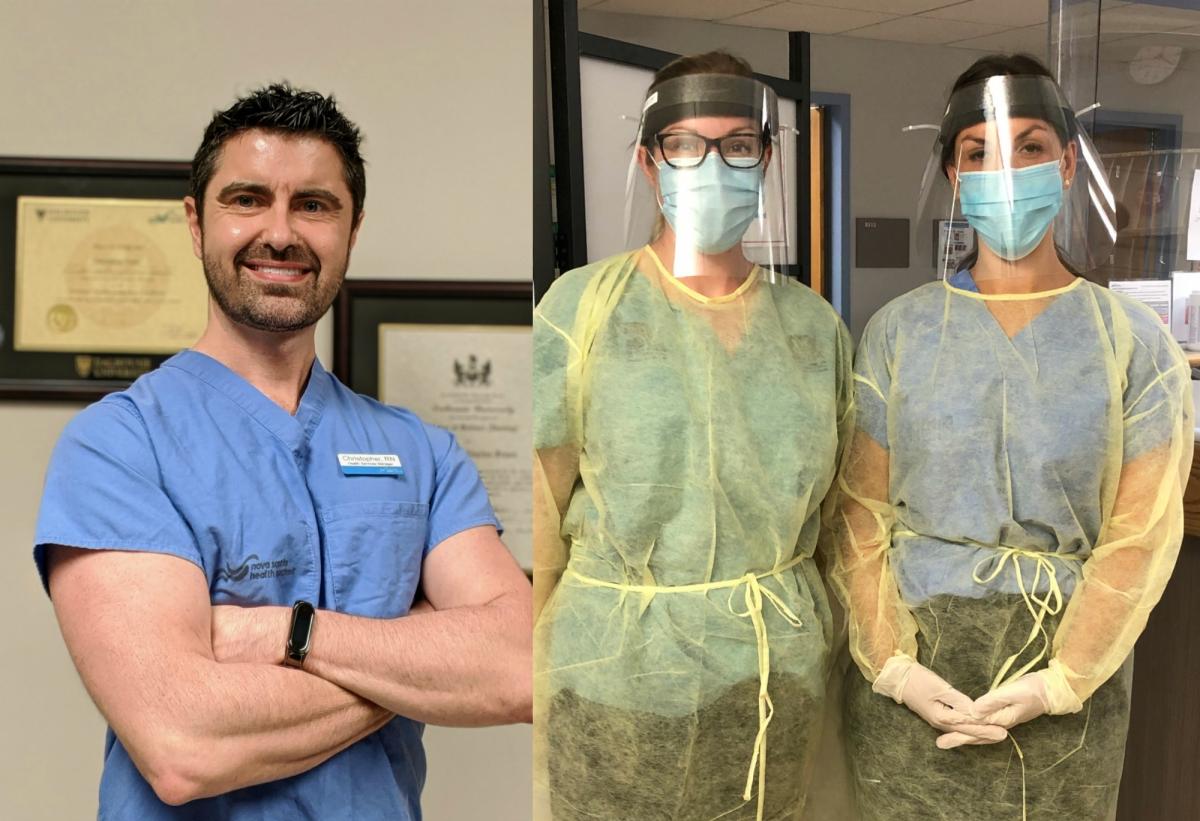
Team members of the QEII's COVID-19 Intermediate Care Unit - Chris Fraser, Breagh Weatherbee, and Maria Collier
When COVID-19 first struck Nova Scotia in March, the QEII Foundation quickly mobilized to establish the QEII COVID-19 Response Fund. As of August 28th, the QEII COVID-19 Response Fund has raised over $546,000 to ensure the QEII Health Sciences Centre and its healthcare teams are equipped and ready, no matter what this pandemic brings their way.
“Even before COVID-19 was here, we knew it was coming and there was massive, massive preparation,” says Chris Fraser, health services manager of the QEII’s COVID-19 Intermediate Care Unit. “We had to restructure units to house potential patients and we started very intense training to ensure we were well-prepared.”
During the peak of the pandemic, the QEII COVID-19 Response Fund has been instrumental in responding to the needs of healthcare teams and funding items that are crucial to help teams navigate the daily challenges of patient care during a pandemic. QEII Foundation donors have not only funded items that are pivotal in ensuring in-hospital safety and timely COVID-19 testing, but also items that allow patients affected by this novel virus to recover safely at home.
Chris Fraser and his team say that the community has shown “amazing, overwhelming support” for the QEII COVID-19 Response Fund and the impact of those donations continues to be felt in all corners of the QEII, every day.
One of the first purchases made with donations received was 1,000 pulse oximeters for COVID-19 patients. A pulse oximeter clips on a patient’s finger and monitors the percentage of oxygen in the blood, along with heart rate. These pieces of technology are vital in order for patients to be safely monitored at home, as respiratory failure can be one of the more severe symptoms of COVID-19.
As the QEII continued to navigate visitor restrictions, donor funds were able to purchase 62 iPads to support families who have been impacted by COVID-19 protocols. These iPads allow patients and their families to connect virtually and enjoy the comfort of being able to see each other, despite having to spend some time physically apart.
In certain cases, these iPads also provided a more “human” connection between in-hospital patients and their healthcare teams.
“When we’re in full PPE, it’s hard for patients to get a sense of who’s treating them. It’s like: ‘you can’t see it, but I’m smiling under my mask!’” says Maria Collier, QEII clinical nurse educator. “Video calls helped a lot in making these conversations feel more personal.”
Donors also played an important role in ensuring that the QEII’s microbiology lab was able to provide accurate and timely testing results. Because of donor generosity, the QEII was able to purchase equipment like an Applied Biosystems (ABI) 7500 Fast, a tool that is crucial for identifying COVID-19 in lab samples. When samples are submitted to the lab for COVID-19 testing, the genetic material from the virus must be amplified in sufficient quantities in order to be detectable. The ABI 7500 Fast Instrument allows the province’s only COVID-19 test lab to do this with incredible speed.
These donors were also able to ensure that health heroes at the QEII could care for patients safely throughout the entire hospital with advanced and strategic sterilization procedures. With thanks to our donor community, the QEII was able to purchase equipment like a CleanFlow Health Care Unit, a piece of equipment that ensures the proper sterilization of N95 masks. Additionally, the QEII was able to purchase high-speed sterilization technology such as Moonbeam units for incredibly fast and effective sterilization of large, high-touch surface areas such as patient rooms, operating rooms, bathrooms, and fixtures or equipment within the health centre.
Additionally, the QEII was also able to purchase equipment that allowed them to care for patients with minimal disruptions, such as handheld, portable ultrasounds. This technology provides accurate clinical assessment and diagnostics, without the patient being required to leave their bed. It allows healthcare teams to meet patients at the point-of-care, make a faster diagnosis, and deliver exceptional care whenever it’s needed.
QEII Foundation donors were also able to help fund several crucial and world-leading research studies that will take place at the QEII Health Sciences Centre. The QEII Foundation joined forces with the Nova Scotia COVID-19 Health Research Coalition which was established to rapidly respond to urgent COVID-19 focused research right here in Nova Scotia.
“From iPads that provide immediate comfort to patients and families, to research that changes how we respond to COVID-19 in the future, QEII Foundation donors have made an incredible impact on Nova Scotia’s fight against COVID-19,” says Susan Mullin, President & CEO of the QEII Foundation. “Donors to the QEII COVID-19 Response Fund have been able to ensure that healthcare teams at the QEII have the support they need on the frontlines and to ensure patients receive exceptional care, whether they are in the health centre or recovering at home.”
To learn more about the QEII COVID-19 Response Fund, visit QE2COVID19Response.ca.